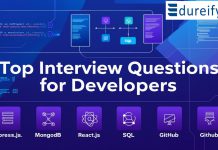
Q: Can you tell us about your experience with programming languages?
A: I have experience with several programming languages including Java, Python, C++, and JavaScript. I have also worked with databases and SQL.
Q: Can you describe your development process?
A: My development process usually involves the following steps: understanding the requirements, designing the solution, implementing the code, testing and debugging, and finally deploying the application. I also believe in continuous integration and continuous deployment, so I like to automate as much of the process as possible.
Q: How do you handle difficult bugs in your code?
A: I usually start by trying to replicate the problem and understanding what is causing it. Then, I use debugging tools to isolate the issue and make changes to the code to fix it. I also like to write unit tests to prevent similar bugs from occurring in the future.
Q: Can you tell us about a particularly challenging project you have worked on and how you overcame any difficulties?
A: One challenging project I worked on involved integrating multiple systems together. It required me to understand how each system worked and find a way to make them communicate with each other seamlessly. To overcome this challenge, I spent a lot of time researching and testing different approaches until I found one that worked. I also collaborated closely with my team members to ensure that we were all on the same page throughout the project.
Q: Can you explain your experience with version control systems?
A: I have experience with Git, which I use to manage version control for my projects. I am familiar with branching, merging, and committing code changes. I also use Git to collaborate with other developers and manage code reviews.
Q: Can you tell us about a project you are particularly proud of?
A: One project I am particularly proud of is a web application that I built for a nonprofit organization. The application helps the organization manage their volunteer database and streamline their volunteer onboarding process. I was able to build the application from scratch and incorporate several features that the organization had requested. The application has been well received by the organization and has helped them increase their volunteer participation.
Q: Can you describe your experience with Agile software development methodologies?
A: I have experience working with Agile methodologies such as Scrum and Kanban. I have worked as part of cross-functional teams, attended daily stand-up meetings, participated in sprint planning, and used tools like Jira to track progress and collaborate with team members.
Q: Can you explain the difference between a software framework and a library?
A: A software framework provides a structure for building applications, while a library is a collection of reusable code that can be used in various applications. A framework typically provides a set of rules and guidelines for developing applications within the framework, whereas a library offers a set of tools and utilities for building specific functionality.
Q: Can you tell us about your experience with front-end development technologies?
A: I have experience with HTML, CSS, and JavaScript, as well as popular front-end frameworks such as React and Angular. I have worked on projects that involved building complex user interfaces and integrating with APIs to retrieve and display data.
Q: Can you explain the difference between a SQL and NoSQL database?
A: A SQL database is a relational database that stores data in tables with a fixed schema, while a NoSQL database is a non-relational database that stores data in flexible, JSON-like documents. SQL databases are good for handling structured data and complex relationships between data, while NoSQL databases are good for handling unstructured or semi-structured data and large volumes of data.
Q: Can you describe your experience with cloud computing platforms such as AWS or Azure?
A: I have experience with AWS and have used services such as EC2, S3, and RDS. I have also worked with AWS Lambda to build serverless applications. I am familiar with using cloud computing to scale applications and reduce infrastructure costs.
Q: Can you tell us about your experience with API development?
A: I have experience building RESTful APIs using frameworks such as Flask and Express. I am familiar with designing API endpoints, handling HTTP requests and responses, and integrating with databases and third-party services.
Q: Can you explain the principles of object-oriented programming?
A: Object-oriented programming is a programming paradigm that focuses on creating reusable code by organizing data and behavior into classes and objects.
The principles of object-oriented programming include inheritance, encapsulation, polymorphism, and abstraction. Inheritance allows classes to inherit properties and methods from other classes, encapsulation refers to the practice of hiding implementation details and exposing only necessary information.
Polymorphism allows objects to take on multiple forms depending on the context, and abstraction refers to the practice of focusing on high-level concepts rather than low-level details.
Q: Can you tell us about your experience with mobile app development?
A: I have experience building mobile applications using React Native and Java for Android. I am familiar with the unique challenges of mobile development such as screen size, performance, and battery life. I have built applications that integrate with device features such as GPS, camera, and push notifications.
Q: Can you explain the concept of asynchronous programming?
A: Asynchronous programming is a programming paradigm that allows code to execute non-blocking operations. Instead of waiting for an operation to complete before moving on to the next line of code, asynchronous programming allows code to continue executing while the operation is being performed. This is often used to improve performance and responsiveness in applications that make network requests or perform long-running tasks.
Q: Can you tell us about your experience with testing and test-driven development?
A: I have experience writing unit tests using frameworks such as Jest and JUnit. I am familiar with the principles of test-driven development, which involves writing tests before writing code to ensure that the code meets the requirements specified in the tests. I also believe in incorporating automated testing into the development process to catch bugs early and ensure that code changes.
Eduriefy is one of the best learning platform for transforming education and its roots. We offer different bootcamp courses which can help you in cracking programming interviews easily. Explore the different courses at Edureify
Master Your Coding Skills with BootSelf AI
If you're looking to enhance your coding abilities and upskill in artificial intelligence, look no further than the BootSelf AI app. This innovative platform provides AI-based coding lessons that are tailored to your individual learning pace.
Available on both iOS and Android, you can download the BootSelf AI app and start mastering coding skills today:





